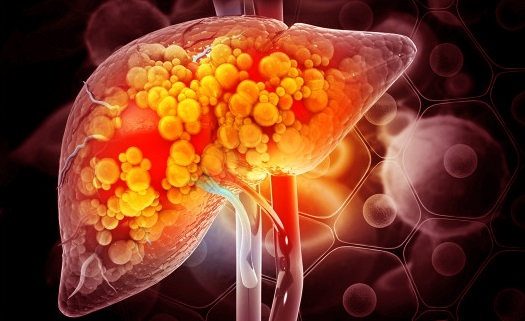Nikhil Prasad Fact checked by:Thailand Medical News Team Jan 08, 2025 11 months, 3 weeks, 3 days, 19 hours, 46 minutes ago
Medical News: Metabolic dysfunction-associated steatotic liver disease (MASLD) has rapidly emerged as a leading cause of liver transplants in the United States. This condition, formerly known as non-alcoholic fatty liver disease (NAFLD), is associated with metabolic issues such as obesity, type 2 diabetes, hypertension, and dyslipidemia. MASLD affects over 25% of the global population, with rates climbing sharply in recent years.
 Liver Stiffness Overcomes Steatosis in Predicting Mortality in MASLD Patients
Liver Stiffness Overcomes Steatosis in Predicting Mortality in MASLD Patients
While MASLD may begin with simple fat accumulation in the liver, it can progress to inflammation and scarring, significantly increasing the risk of severe liver diseases like cirrhosis and hepatocellular carcinoma. Accurate tools to predict outcomes in MASLD patients are essential for early intervention and management.
In this
Medical News report, we examine findings from a study conducted by researchers from Mayo Clinic in Florida and the University of Pennsylvania-USA. Their work focuses on the predictive power of two specific liver measurements: the controlled attenuation parameter (CAP), which assesses fat levels in the liver, and liver stiffness measurement (LSM), which gauges scarring or fibrosis.
Study Background and Approach
The researchers utilized data from the 2017-2018 National Health and Nutrition Examination Survey (NHANES), focusing on 3,821 MASLD patients. The participants underwent a specialized ultrasound technique called vibration-controlled transient elastography (VCTE). This technology measures both CAP and LSM, offering a non-invasive way to evaluate liver health.
To ensure a robust analysis, the study excluded individuals under 18 years old, those with other liver conditions such as hepatitis B or C, and individuals with significant alcohol consumption history. The final analysis explored the relationship between CAP, LSM, and all-cause mortality, employing statistical models to adjust for potential confounders like age, gender, and metabolic conditions.
Key Findings: Fibrosis Takes Center Stage
The study’s results were striking. Liver stiffness, as measured by LSM, showed a clear and independent correlation with mortality. For every unit increase in LSM, the risk of death rose significantly. In contrast, the CAP, which measures fat levels in the liver, showed no meaningful association with mortality.
This challenges previous research that suggested both fat and fibrosis contribute to mortality risks in MASLD patients. By focusing on LSM, the study highlights the critical role of fibrosis in determining patient outcomes.
What Does This Mean for Patients?
Fibrosis, or liver scarring, appears to be the most significant factor influencing survival in MASLD patients. While fat accumulation (steatosis) is a hallmark of MASLD, it is not as closely tied to mortality as fibrosis. This distinction has profound implications for diagnosis and treatment.
Using tools like VC
TE, clinicians can identify patients with higher levels of liver stiffness, signaling advanced fibrosis. These patients may benefit from closer monitoring, lifestyle interventions, and potentially medical therapies aimed at slowing or reversing fibrosis progression.
Study Limitations and Future Directions
While this study provides compelling evidence, it is not without limitations. The relatively short follow-up period of one to two years may not fully capture the long-term impacts of steatosis on mortality. Additionally, the study focused on all-cause mortality rather than liver-specific deaths, leaving room for further research.
Moreover, participants with higher body mass indexes or those unable to complete VCTE due to medical reasons were excluded, which may limit the generalizability of the findings. Future studies with larger cohorts and longer follow-up periods are needed to validate these results and explore other factors influencing MASLD outcomes.
Conclusion: A Shift in Focus
This study underscores the importance of fibrosis, rather than fat accumulation, in predicting mortality among MASLD patients. Clinicians should prioritize assessing liver stiffness when evaluating risks and crafting treatment plans for these individuals. Non-invasive tools like VCTE can play a pivotal role in identifying patients at higher risk and guiding appropriate interventions.
In light of these findings, researchers and healthcare providers must continue exploring strategies to manage fibrosis and improve outcomes for MASLD patients. Addressing the root causes of fibrosis, such as metabolic dysfunction and inflammation, will be crucial in reducing mortality and enhancing quality of life.
The study findings were published in the peer-reviewed journal: Livers.
https://www.mdpi.com/2673-4389/4/4/49
For the latest on MASLD, keep on logging to Thailand
Medical News.
Read Also:
https://www.thailandmedical.news/news/new-perspectives-on-fatty-liver-disease-awareness
https://www.thailandmedical.news/news/lycorine-s-potential-as-a-treatment-for-liver-disease
https://www.thailandmedical.news/news/natural-compound-from-waterlily-shows-promise-in-fighting-fatty-liver-disease
